May 27, 2025 | 15:54 GMT +7
May 27, 2025 | 15:54 GMT +7
Hotline: 0913.378.918
May 27, 2025 | 15:54 GMT +7
Hotline: 0913.378.918
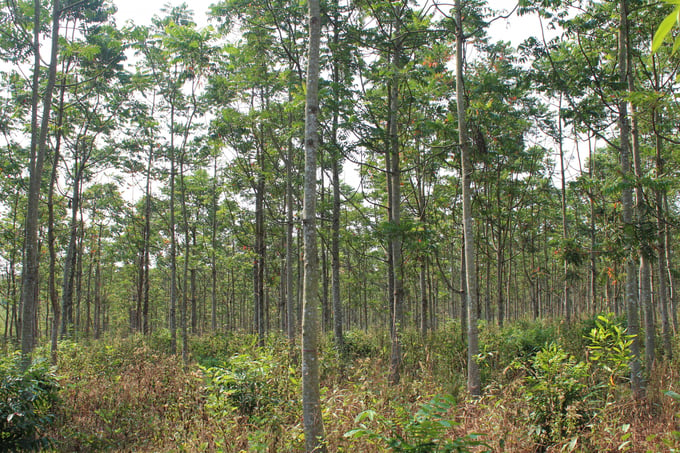
The VAFS model of plantations providing large timber with Simaroubaceae variety has just been recognized by the Ministry of Agriculture and Rural Development. Photo: NH.
The Vietnamese Academy of Forest Sciences (VAFS), formerly known as the Forest Research Institute, was established in 1961 under Decree No. 140-CP dated September 29, 1961 of the Government Council.
After many separations, the Council of Ministers made a decision to merge the institutes into the VAFS to suit the renewal and development of the country in August 1988.
On November 25, 2011, the Prime Minister signed Decision No. 2099/QD-TTg and upgraded the VAFS to be a Special Class Institute under the Ministry of Agriculture and Rural Development.
According to Prof. Dr. Vo Dai Hai, Director of the VAFS, the academy currently has 17 affiliated units from north to south that are managing more than 11,700ha. The area is the site of visiting, learning and transferring technology for production facilities. Its laboratory system has also been upgraded with many modern equipment, including the National Vilas Standard Wood Materials and Technology Laboratory for wood research and assessment.
In the past 60 years, VAFS has carried out nearly 1,200 scientific projects at all levels, achieving many valuable results of high scientific and practical significance. The academy has always been a leading establishment of forestry plant breeding in Vietnam as over 90 per cent of recognised forest plant varieties have been created by the academy.
In total, 243 new varieties of VAFS have been recognized by the Ministry of Agriculture and Rural Development with high yield and quality (average growth of 20-40m3/ha/year), significantly contributing to improving the productivity and quality of planted forests while creating a source of raw materials for the processing industry. In which, 6 varieties have been awarded the Vietnam Golden Rice Award and another 45 have been used commonly in production.
In recent years, its research on breeding indigenous tree species for timber and non-timber forest products has also been gradually promoted and achieved important results. Up to now, 10 varieties of Ailanthus triphysa, Terminalia calamansanai and 1 variety of Wurfbainia longiligularis have been recognized. One variety of Prunus Arborea and one variety of Lai Chau ginseng have had their breed protected for the first time.
In terms of macadamia varieties, VAFS has 10 recognized varieties, producing a seed yield of 14-22 kg of seeds/tree at the age of 8-10, which has greatly contributed to the development of the macadamia industry in Vietnam. In addition, 9 technical advances of the academy have been recognized by the Ministry of Agriculture and Rural Development.
In terms of planted forests, VAFS has studied intensive afforestation techniques for the group of fast-growing imported species, native large trees, multi-purpose trees, non-timber forest products and medicinal plants. This is the scientific basis for determining the structure of forest trees for ecological zones. Hundreds of procedures and technical guidelines for multiplication, afforestation and pest control have been issued.
Along with that, the Ministry of Agriculture and Rural Development has recognized 13 technical advances in multiplication, 10 technical advances in site management, afforestation and conversion of small timber plantations into large timber and non-timber forest products, four technical advances in production of bio-products to improve soil for acacia and eucalyptus forests and to decompose combustible materials under the canopy of pine forests, and two technical advances in integrated pest and disease management of acacia and pine forests of VAFS.
Meanwhile, the Ministry of Science and Technology has published four Vietnam Standards of the academy on the requirements of planting sites for acacia and eucalyptus species, converting small wood into big wood acacia and eucalyptus.
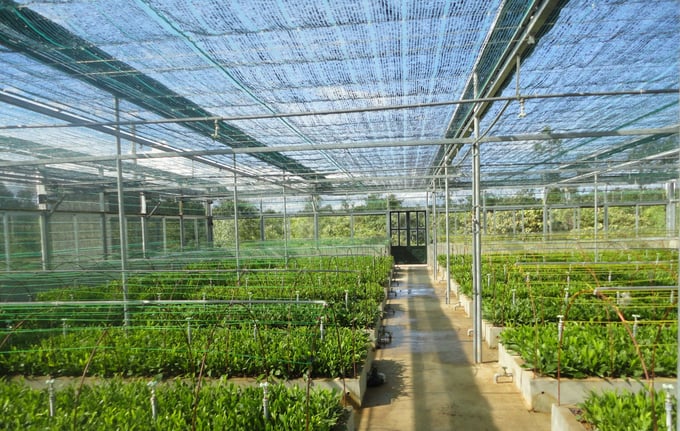
Greenhouse system with automatic sprinkler irrigation technology of VAFS. Photo: QL.
In terms of natural forests, VAFS has studied the classification of Vietnamese forests, silvicultural characteristics for the main forest ecosystems, solutions for forest restoration and biodiversity conservation associated with community livelihood development in world biosphere reserves such as Cat Ba and Dong Nai.
It has also carried out many projects on conservation and exploitation of genetic resources for endangered and rare forest plant species and associated with OCOP product development, in addition to studies on integrated silviculture that have determined the ability to accumulate carbon for planted forests and natural forests, providing a scientific basis for payment for forest environmental services in the country.
Since 2021, VAFS has been assigned to operate the National Forest Certification System (VFCS). Up to now, this system has been recognized by The Programme for the Endorsement of Forest Certification (PEFC) and granted certificates to 120,000 ha of more than 20 rubber enterprises under the Vietnam Rubber Industry Group and tens of thousands of hectares of acacia forest for groups of households and cooperatives.
Regarding the forest industry, VAFS has researched and built a database of structure and properties for more than 800 species of wood and bamboo, production technology of block wood/bamboo, and large size laminated plywood and modified thin board from plantation wood.
The academy has been producing flooring, activated carbon from mangrove wood, plywood, MDF board from Melaleuca wood, in addition to conducting research on creating bio-composite boards without using glue; using solar energy to dry wood, adopting anti-fouling paint technology in producing wooden boats, creating wood glue that can replace imported glue and is environmentally friendly.
It has successfully researched and applied many types of environmentally friendly wood preservatives, treated woodblocks of the Nguyen Dynasty and archaeological wood for heritage conservation.
In addition, VAFS has researched, designed and manufactured mobile shredders greenhouse with automatic shading and sprinkler irrigation and self-degrading nursery pots.
Other achievements of VAFS include designing and manufacturing improved underground plows and forest care plows that meet the requirements of farming on sloping land.
Through the research results, VAFS has developed and issued 34 Vietnamese Standards, had 13 technical advances recognized, granted with 1 Patent, 1 industrial design registration and 2 utility solutions. It has received one Vietnam Golden Rice Award and one Creative Labor Diploma.
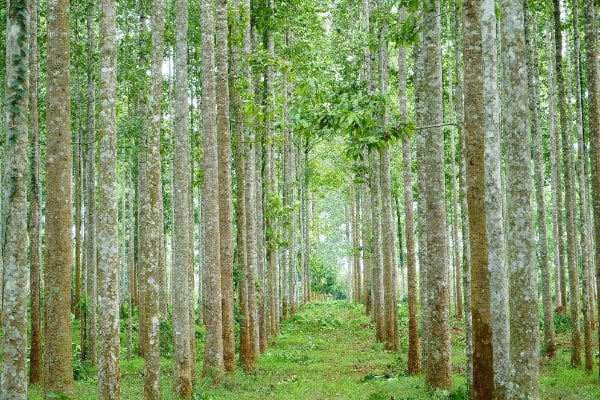
Model of 9-year-old acacia plantation forest with progressive application of sustainable site management. Photo: NH.
Regarding economics and forestry policy, VAFS has researched and developed economic and technical norms of the sector, policies on land allocation, forest allocation, development of large timber plantations, forest benefits, management and protection, insurance... Forest pricing research has been the basis for the issuance of a pilot policy on payment for forest environmental services.
Recently, VAFS has researched and developed the iTwood System for management and traceability of legal timber in accordance with international regulations to promote forest product exports and digital transformation in the forestry industry.
“Although there are still many difficulties and challenges ahead, the Vietnam Academy of Forestry Science, together with the efforts and determination of all members of the academy and the support of relevant ministries, branches and localities, VAFS will continue to strive for stronger and more comprehensive development, making more contributions to the forestry sector to deserve a special rank of the Ministry of Agriculture and Rural Development.” Prof. Dr. Vo Dai Hai, Director of VAFS emphasized.
Translated by Phuong Ha
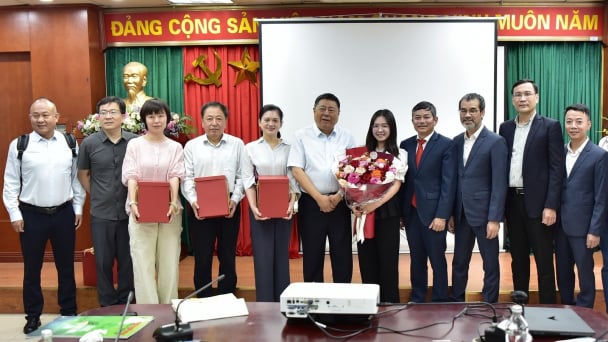
(VAN) The alignment in goals and operational direction between the Vietnam Agriculture and Nature Newspaper and Shaanxi Daily opens up promising prospects for journalism and media cooperation.
/2025/05/26/3422-3-102748_432.jpg)
(VAN) Prime Minister Pham Minh Chinh has been honored as the Distinguished ASEAN Leader at the ASEAN Leadership and Partnership Forum (ALPF) 2025 held in Malaysia, affirming Vietnam’s role and reputation.
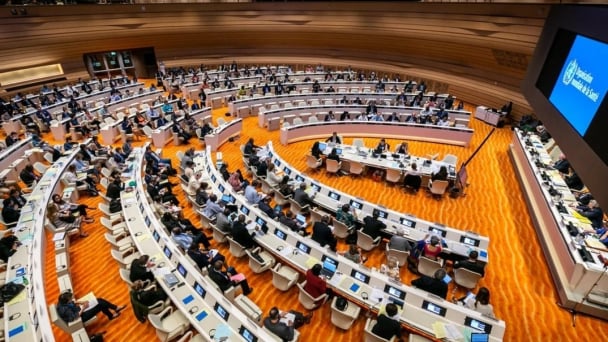
(VAN) At WHA78, with health placed at the heart of the global climate storm, Viet Nam enters a new commitment to protect communities from increasingly severe risks.
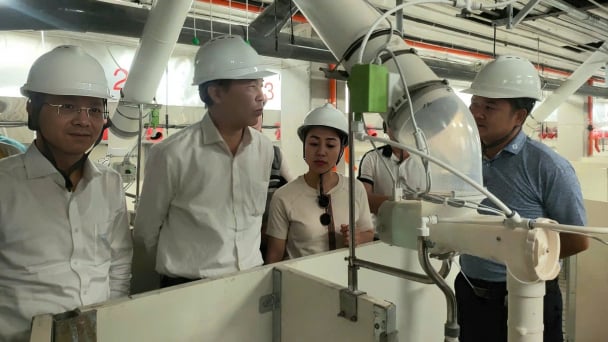
(VAN) Despite investment costs being 1.5 to 1.8 times higher than conventional methods, multi-story pig farming demonstrates outstanding effectiveness, increasing land-use efficiency by 4 to 10 times.
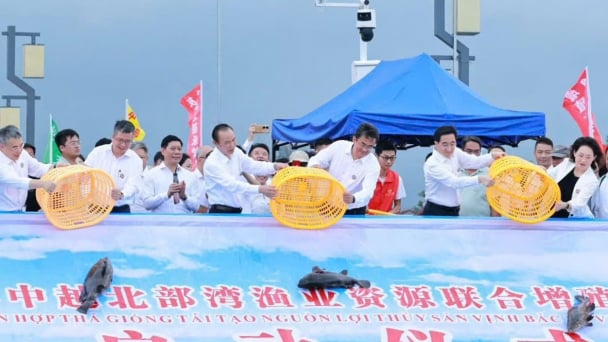
(VAN) Deputy Minister of Agriculture and Environment Phung Duc Tien leads a working delegation to participate in several key activities in China aimed at promoting agricultural and fisheries cooperation.
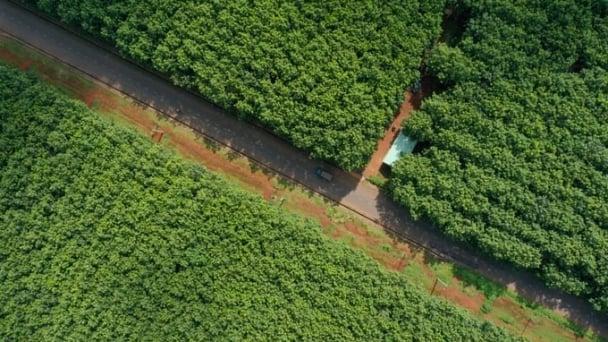
(VAN) The European Commission has just released a list of ‘low-risk’ countries for deforestation, which includes Vietnam.

(VAN) The convenience of single-use plastics is leaving lasting consequences for the oceans.